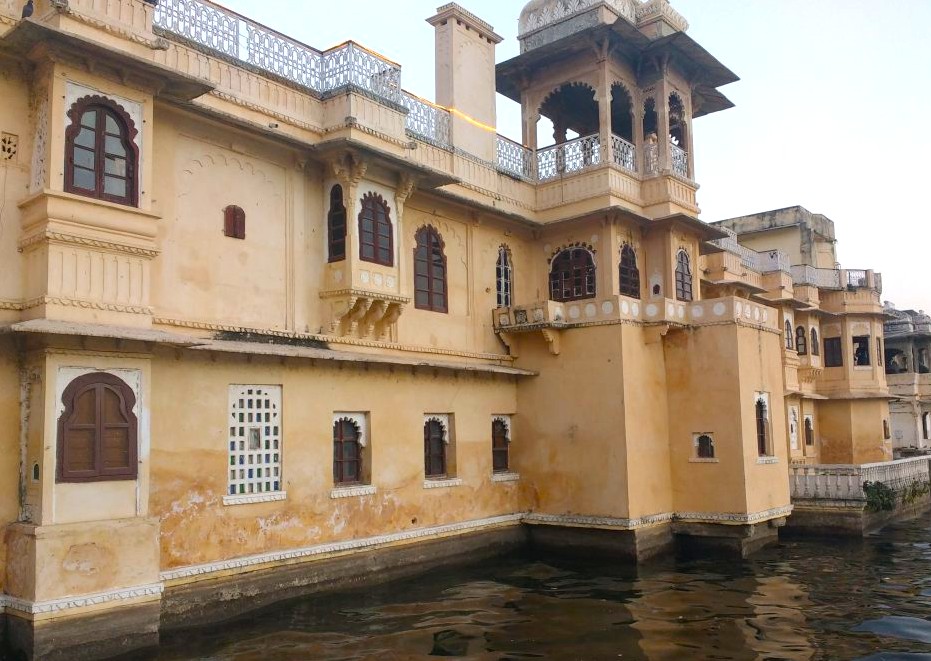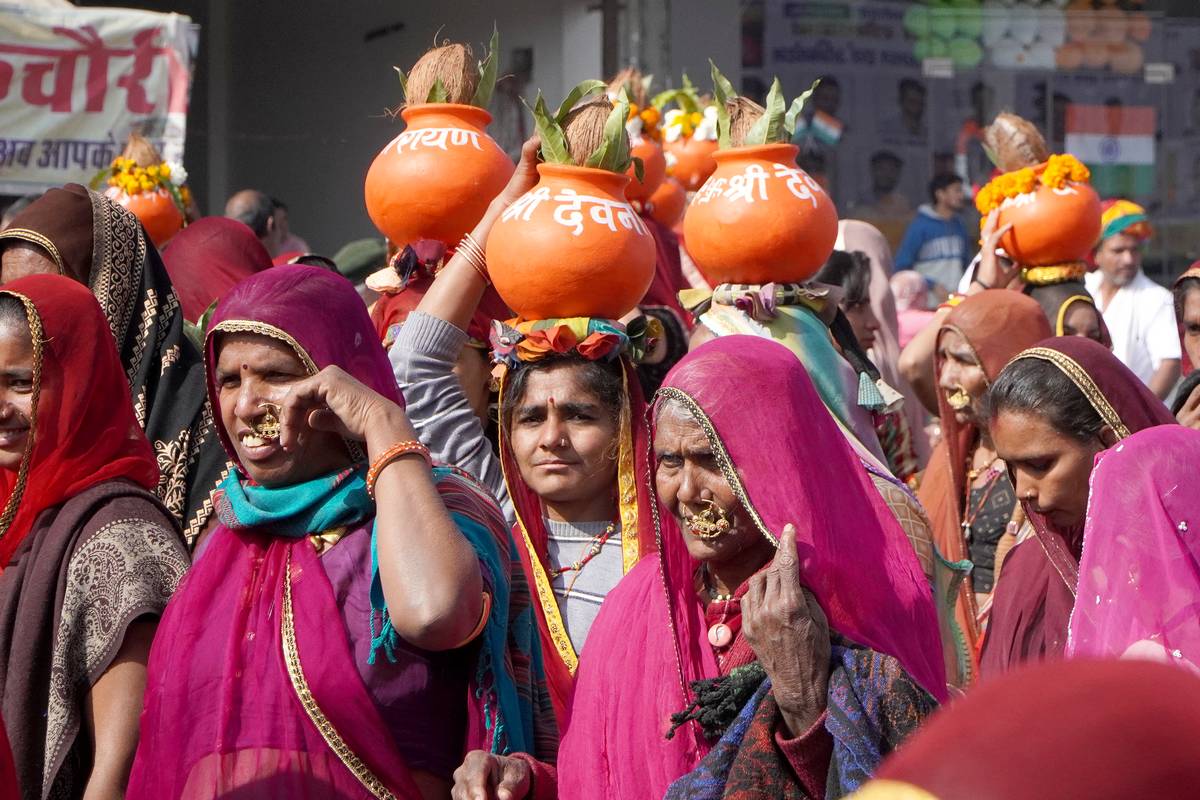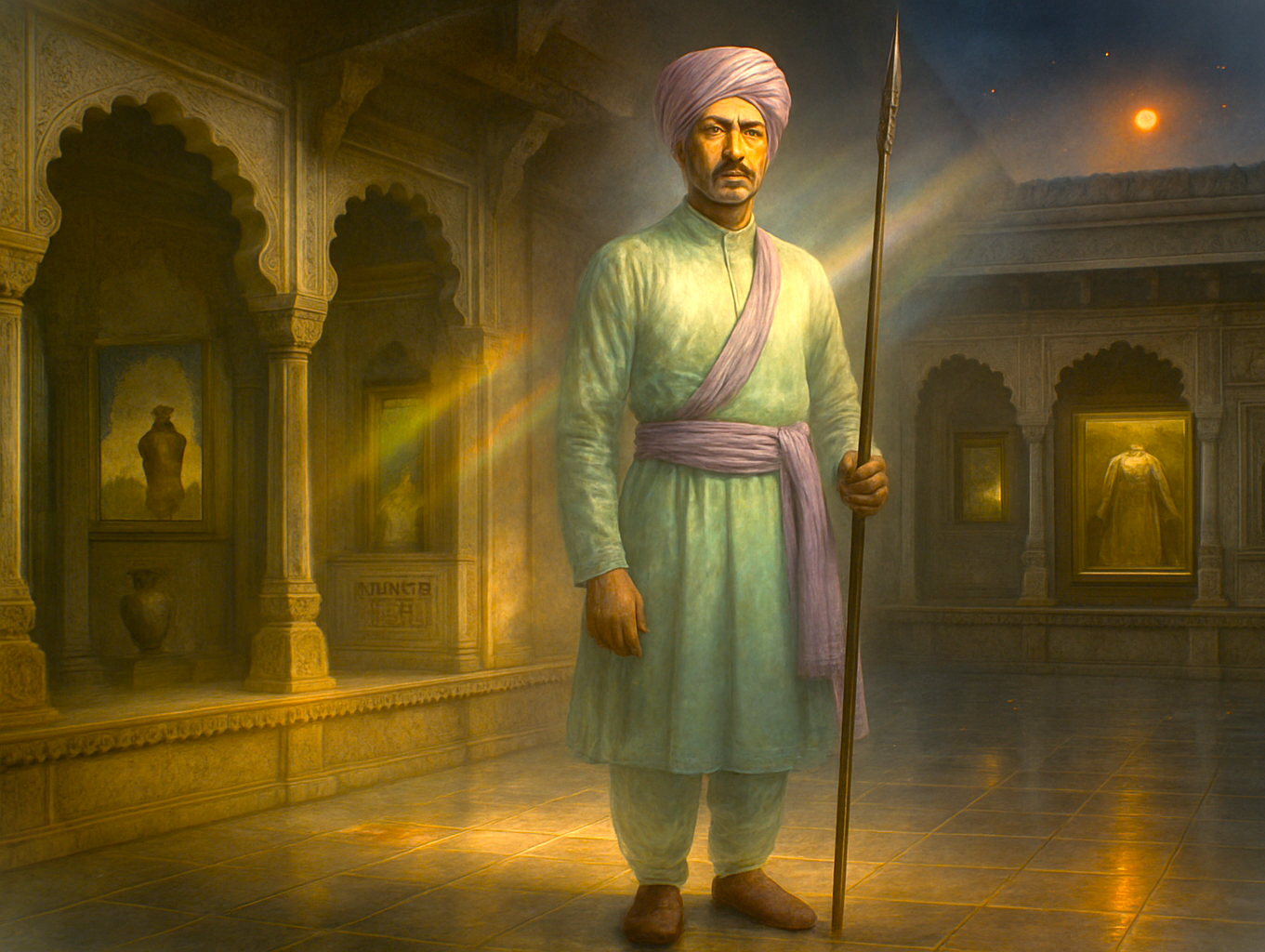
Desert Realm Odysee Tour Rajasthan
Bagore Ki Haveli Museum Udaipur - India
Mother Masala Tours
The Royal Dharohar
Bagore Ki Haveli Museum Udaipur. Approaching the Museum, we will instantly feel the allure of its historical significance. This stunning palace, located on the shores of Lake Pichola, was built in the 18th century by Amar Chand Badwa, who was the Prime Minister of the Mewar Kingdom. Originally constructed as a residence for the royal family, it later served various administrative purposes. Its name, Bagore Ki Haveli, translates to "Haveli of Bagore," connecting it to Maharaja Shakti Singh, who further developed the property. In 1986, the haveli was converted into a museum, allowing us to explore its vivid collections, including traditional costumes, artifacts, and art that represent the customs and daily life of the royal family.

Bagore Ki Haveli Museum Udaipur: Timeless Artifacts
Bagore Ki Haveli Museum Udaipur. Inside we find countless artifacts that reveal the rich cultural tapestry of Rajasthan. The museum is home to an incredible collection of items, including intricate traditional garments worn by the royal family, ornate jewelry, and exquisite weapons that tell stories of valor and tradition. We view paintings that depict the lifestyle of Rajasthan through various periods, with art ranging from classical to folk styles. Each room in the haveli offers unique displays of historical significance, including a collection of ancient manuscripts and coins. As a Unesco World Heritage site, this remarkable complex emphasizes the importance of its preservation. The sacred spaces within the haveli, including the serene courtyards and open-air amphitheaters, provide a sense of peace.
Ancient Mosaics: Impeccable Craftsmanship

The intricate craftsmanship here is awe-inspiring. Each design element of the building reflects the unparalleled skill of local artisans who dedicated their talents to create stunning works of art. The intricate jharokhas – these beautiful overhanging enclosed balconies – and detailed carvings are reminiscent of the magnificent Rajput style, symbolizing the rich heritage of the rulers. Artisans began their meticulous work upon the construction of the haveli in the 18th century, employing traditional techniques that had been passed down through generations. This dedication ensured every detail contributed to its grandeur.
Capturing the Magic: A Photographic Haven
The Bagore Ki Haveli Museum Udaipur. Provides countless opportunities for photography. The stunning backdrops of intricate murals, artisan-crafted wooden doors, and traditional decor create a unique setting that mesmerizes each of us. In the open-air amphitheater, the spectacular views of Lake Pichola coupled with the ornate haveli present a beautiful composition.
Festivals of Devotion: Honouring the Sacred and the Divine

Udaipur hosts numerous vibrant festivals that highlight the rich cultural heritage of the region. One of the most significant celebrations is Diwali, observed in October or November, symbolizing the profound victory of light over darkness. During this joyous time, the streets come to life with dazzling decorations, local families gather to share traditional sweets and heartfelt greetings, and the entire atmosphere is filled with palpable excitement and communal warmth. Additionally, the Gangaur Festival - in March or April, beautifully honors Gauri, the goddess of marriage and family.
The Connection with the Gods
Spirituality plays a critical role in the lives of the people of Udaipur, particularly at the Haveli, where various deities are revered. Durga holds a prominent place in the hearts of the locals, symbolizing strength and empowerment. During Navratri, a nine-night festival dedicated to the goddess, the city reverberates with energy as rituals and prayers take center stage. Enthusiastic celebrations include dance performances, regional music, and vibrant decorations adorning homes and temples, creating an atmosphere of devotion and joy. Shiva is also celebrated widely, with temples honoring him situated throughout Udaipur.
Serendipitous Meetings: Beyond the Main Path

As we walk through the narrow lanes of Udaipur surrounding the Haveli Museum, we encounter various artisans and craftsmen, each engaged in their own unique trades. This exploratory experience allows us to uncover hidden gems, from pottery shops to textile workshops, where skilled artisans produce beautiful, handmade crafts. The air is filled with the sounds of diligence, as craftsmen work on intricate designs, welcoming us to observe their processes and learn from their expertise. Every corner reveals a story of tradition and artistry, offering insights into age-old techniques. You can admire delicate miniature paintings or watch silversmiths at work.
Resilience and Renewal: Overcoming Adversity’s Challenges
In 1568, the city faced a harsh invasion by the Mughal Empire, leading to significant changes in the power dynamics within the region. Despite the challenges posed by various sieges and battles over the years, the local community displayed unwavering strength and commitment to their heritage. During the Great Rebellion of 1857, Udaipur remained a stronghold against British forces, revealing the determination of its residents to uphold their identity. Natural disasters, including devastating floods in 2006, disrupted daily life and infrastructure, prompting the city to rally together for recovery efforts.
Urban Legends: Strange Sightings, Myths and Mysteries

One of the most notable stories revolves around the ghost of a royal guard, said to roam the halls of the Museum. Locals recount how they can occasionally hear the eerie clattering of armor late at night, accompanied by a faint glow seen near the upper balconies. This haunting presence evokes curiosity and intrigue, drawing in those interested in the supernatural. Another tale involves the cursed well located within the palace grounds. Legends claim that any who attempt to drink from its waters will encounter a series of misfortunes, bringing bad luck upon themselves and their families. This lore adds a layer of mystery.
Pack Your Bags, We’re Going, and You’re Invited
Join us into the heart of Udaipur, India. We will wander through this historical treasure, immersing ourselves in its rich culture and captivating tales, whispered through generations. As we uncover the artistic heritage, marveling at the intricate details of its craftsmanship, we will savor local cuisine, a true delight for the senses. Enjoy the genuine hospitality of the proud community, whose warmth embraces every visitor. Each moment will be filled with profound learning and deep connection, creating cherished memories.
Symphony of Generosity: Offerings from Wanderers to Residents

The relationship between the local community and those who explore the haveli is one of mutual enrichment. By purchasing handcrafted items and participating in workshops, we contribute to sustaining the livelihoods of local artisans while fostering a sense of connection between cultures. This interchange promotes economic stability for residents, allowing them to maintain their traditions while sharing their rich heritage with people from around the world. Visitors gain authentic insights into age-old techniques and compelling stories, deepening their understanding of this vibrant culture.
Step Inside The Story - View All Tour Itineraries & Details
We’re here to offer genuine, thoughtful guidance for your travels. As a small, dedicated team, we pay close attention to every detail so you can focus on enjoying the experience while we take care of the planning. We believe the best trips begin when someone truly listens to what you want and how you like to travel, so the journey feels right for you and contributes to a happy, positive group on tour. Our communication stays clear, straightforward, and respectful at every step, with the goal of helping you feel understood, supported, and confident from first contact to the end of your journey. Click here:- Discover Life Travel - India Tour Specialists